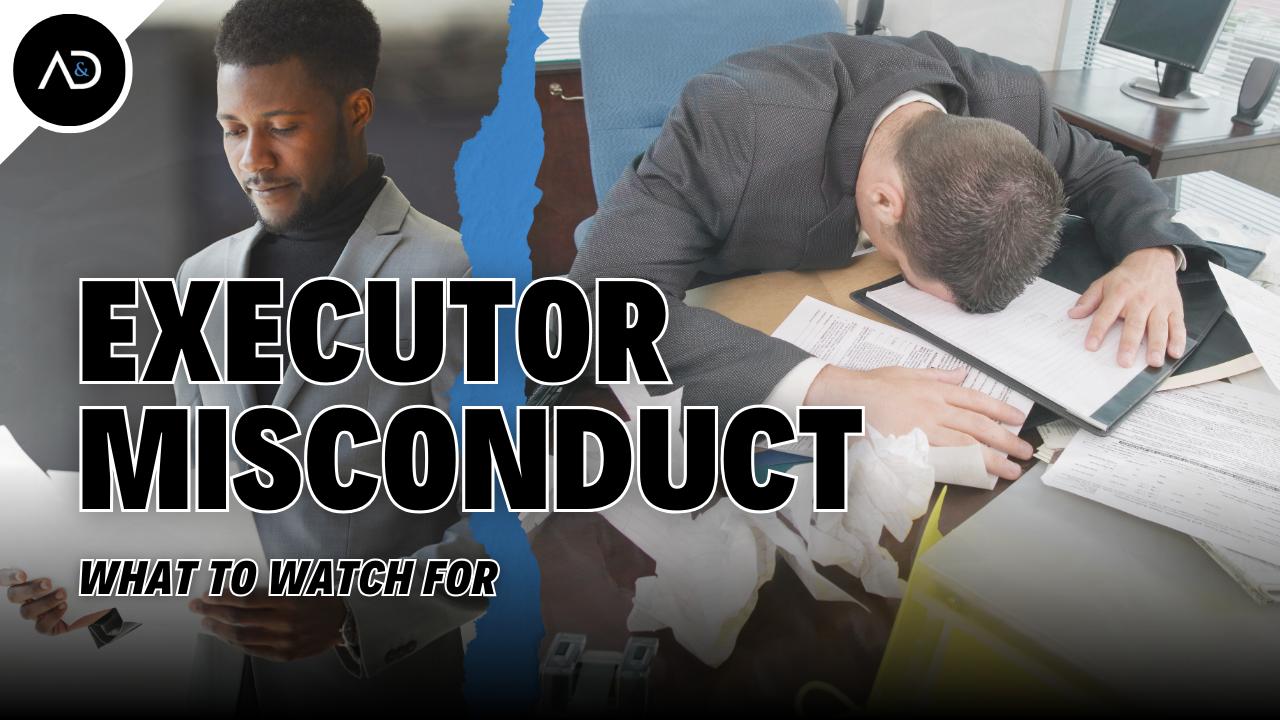
Executors play a critical role in managing and distributing a decedent’s estate. In California, they are bound by strict fiduciary duties under the Probate Code (Sections 7000–12590). These duties are not optional, they are legal obligations. When an executor fails to meet them, it’s called executor misconduct, and it can seriously harm the estate and its beneficiaries.
Here are some of the most common and concerning examples of executor misconduct:
-
Failure to Inventory and Appraise Estate Assets
One of the first and most essential responsibilities of an executor is to identify and value all assets in the probate estate. This includes:
- Compiling a full inventory (a complete list of the estate’s assets)
- Appraising the value of liquid assets (like bank accounts)
- Coordinating with the court-appointed probate referee—a professional appraiser—to value non-cash items (real estate, personal property, etc.)
When an executor fails to file this inventory and appraisal, heirs are left in the dark. They don’t know what the estate contains or what it’s worth. This lack of transparency can delay administration and erode trust
-
Mismanaging Estate Assets
Executors must handle estate assets prudently, as a reasonable person would manage someone else’s property. Mismanagement includes:
- Failing to safeguard valuable items
- Keeping risky investments in a volatile stock portfolio
- Letting real estate fall into disrepair
- Failing to collect rents or pay expenses on rental properties
- Allowing insurance coverage to lapse
Poor management can lead to significant financial loss, which ultimately hurts the rightful heirs. In some cases, beneficiaries may ask the court to compel the executor to act or even seek their removal for negligence.

-
Failure to Enforce Estate Claims
If someone owed the decedent money or property at the time of their death, the executor has a duty to pursue that claim. This could include:
- Collecting on outstanding personal loans
- Demanding return of property
- Filing lawsuits if needed to enforce the estate’s rights
Ignoring these obligations means the estate could lose substantial value that rightfully belongs to the beneficiaries.
-
Conflicts of Interest
Executors are legally prohibited from acting in ways that benefit themselves at the expense of the estate. Common conflicts of interest include:
- Approving repayment of a personal loan the executor made to the decedent
- Selling estate assets to themselves or their relatives
- Purchasing estate property without court approval
These types of transactions require prior court approval. Skipping that step isn’t just a mistake, it’s a breach of fiduciary duty.
Unfortunately, many executors either don’t understand these rules or choose to ignore them. In either case, beneficiaries can (and should) seek legal intervention.
-
Failure to Provide an Accounting
Executors are required to provide a formal accounting to the beneficiaries. This means disclosing:
- All income and expenses of the estate
- All distributions made
- The current status of estate assets
When an executor fails to provide an accounting, or gives an incomplete or misleading one, it raises red flags. Beneficiaries have a right to know how the estate is being managed. Failure to account can justify court action, including removal of the executor and recovery of damages.

Conclusion: What Can You Do?
Executor misconduct can delay probate, deplete estate value, and unfairly harm beneficiaries. If you suspect an executor is breaching their duties, don’t wait. You have the right to petition the probate court for an order compelling action or to seek their removal and replacement.
At its core, the executor role is about trust—and when that trust is broken, the law provides ways to set things right.
If you’re unsure whether you need legal help, consider scheduling a free consultation with an experienced probate lawyer. A good lawyer can quickly assess your situation and guide you on the best course of action.

